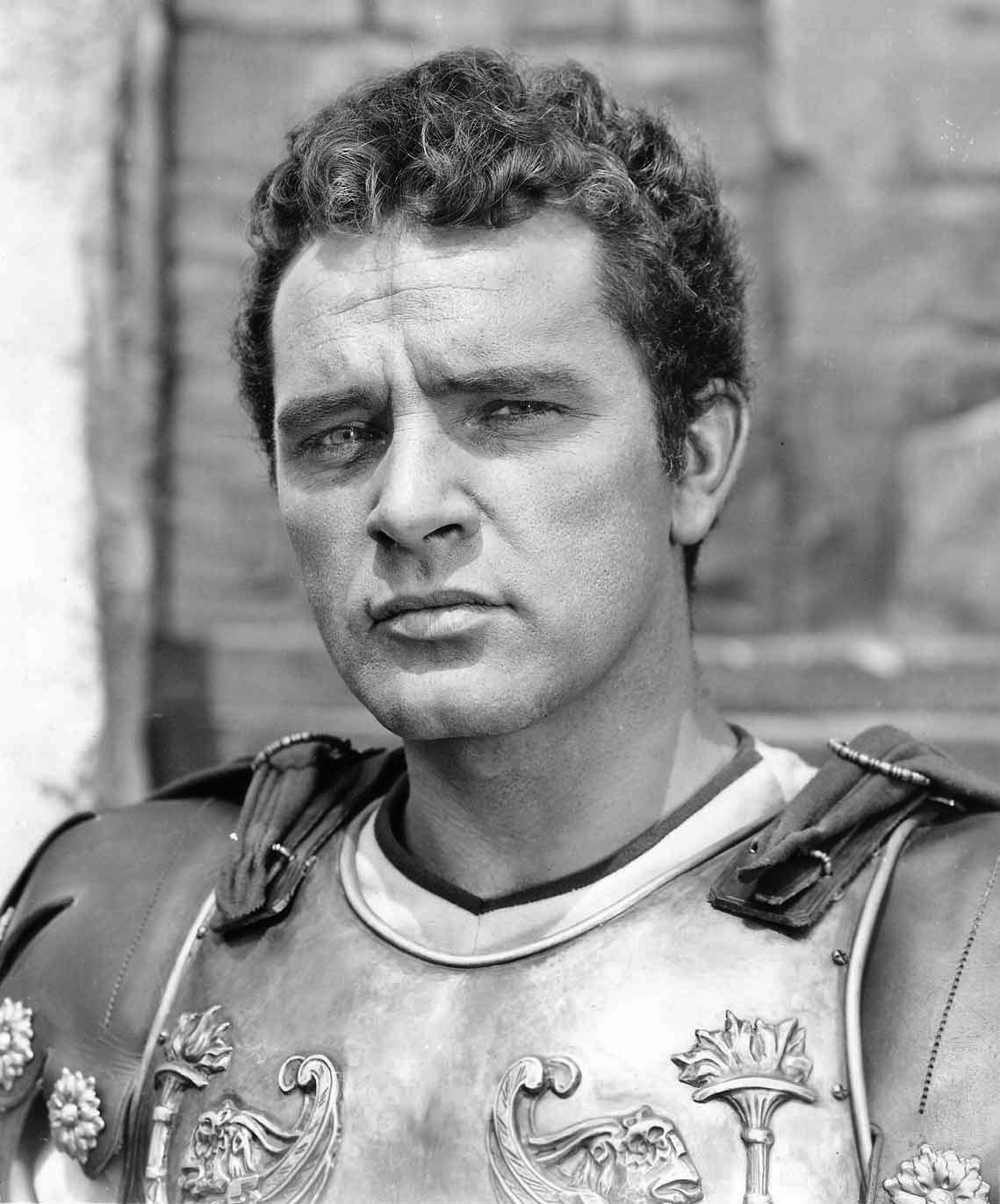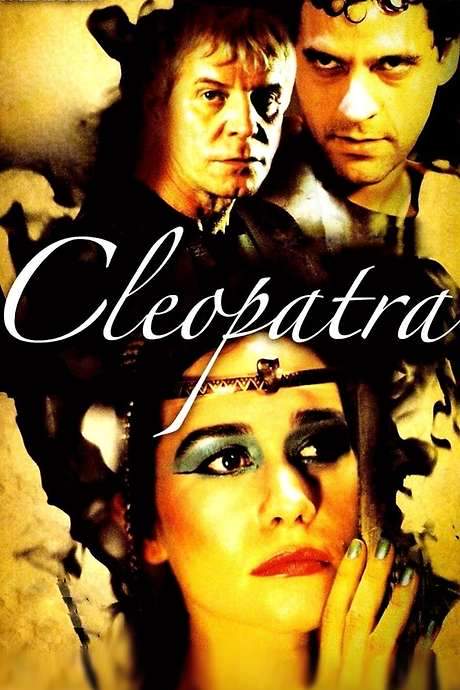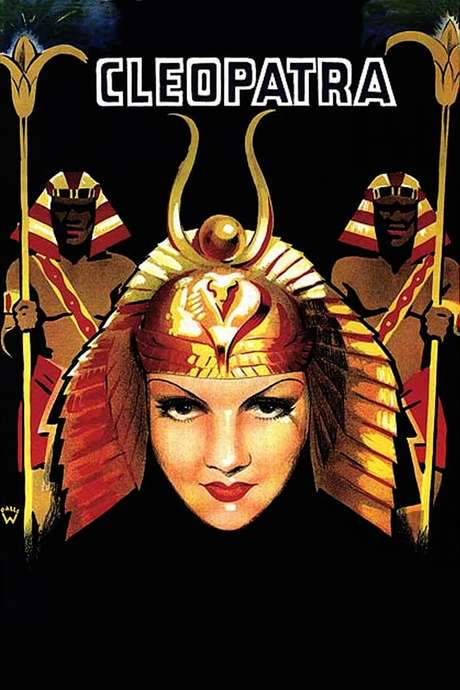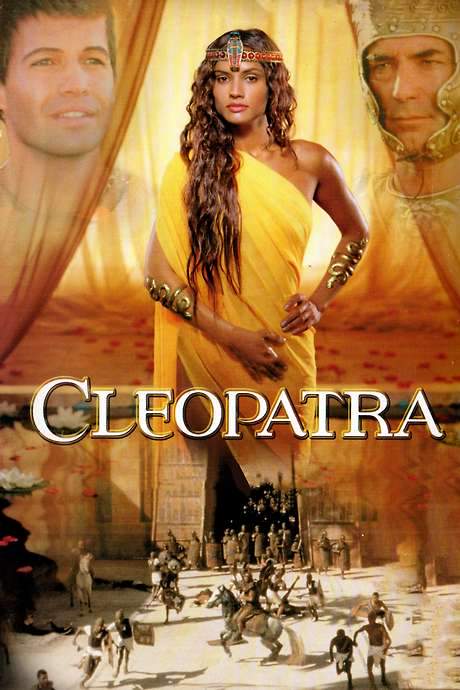Cleopatra 1963

This biographical film explores the life of Cleopatra, the last pharaoh of Egypt, and her passionate relationships with Julius Caesar and Mark Antony. The story follows her ambitions and struggles as she navigates political intrigue and fights to maintain her kingdom's independence during a period of Roman expansion. Witness her legendary charm and formidable strength in this sweeping historical drama.
Does Cleopatra have end credit scenes?
No!
Cleopatra does not have end credit scenes. You can leave when the credits roll.
Meet the Full Cast and Actors of Cleopatra
Explore the complete cast of Cleopatra, including both lead and supporting actors. Learn who plays each character, discover their past roles and achievements, and find out what makes this ensemble cast stand out in the world of film and television.
External Links and Streaming Options
Discover where to watch Cleopatra online, including streaming platforms, rental options, and official sources. Compare reviews, ratings, and in-depth movie information across sites like IMDb, TMDb, Rotten Tomatoes or Metacritic.
Ratings and Reviews for Cleopatra
See how Cleopatra is rated across major platforms like IMDb, Metacritic, and TMDb. Compare audience scores and critic reviews to understand where Cleopatra stands among top-rated movies in its genre.

60
Metascore
6.7
User Score

7.0 /10
IMDb Rating

70
%
User Score
Take the Ultimate Cleopatra Movie Quiz
Challenge your knowledge of Cleopatra with this fun and interactive movie quiz. Test yourself on key plot points, iconic characters, hidden details, and memorable moments to see how well you really know the film.
Quiz on Cleopatra (1963): Test your knowledge on the historical drama film Cleopatra and its intricate plot and characters.
Who plays the character of Julius Caesar in the film?
Rex Harrison
Richard O'Sullivan
George Cole
Andrew Faulds
Show hint
Awards & Nominations for Cleopatra
Discover all the awards and nominations received by Cleopatra, from Oscars to film festival honors. Learn how Cleopatra and its cast and crew have been recognized by critics and the industry alike.
36th Academy Awards 1964
Art Direction (Color)
Cinematography (Color)
Costume Design (Color)
Film Editing
Music (Music Score—substantially original)
Best Picture
Sound
Special Effects
21st Golden Globe Awards 1964
Best Motion Picture – Drama

Best Supporting Performance in a Motion Picture – Drama, Comedy or Musical (Supporting Actor)
Roddy McDowall
Full Plot Summary and Ending Explained for Cleopatra
Read the complete plot summary of Cleopatra, including all major events, twists, and the full ending explained in detail. Explore key characters, themes, hidden meanings, and everything you need to understand the story from beginning to end.
After the pivotal Battle of Pharsalus in 48 BC, Julius Caesar (Rex Harrison) emerges as the undisputed ruler of Rome after defeating Pompey’s forces. At his side is his slave Flavious (George Cole). News comes from Canidius ([Andrew Faulds]), a general in Anthony’s cavalry, that Pompey has escaped, presumably on his way to Egypt. Setting his sights on the land of the Pharaohs, Julius pretends to take up the role of executor for the will of the late father of the young Pharaoh Ptolemy XIII ([Richard O’Sullivan]) and his sister Cleopatra (Elizabeth Taylor).
Caught in the throes of a fierce rivalry, Ptolemy and Cleopatra are embroiled in a destructive war against one another that endangers the grain supply crucial for Rome. Julius dispatches Mark Antony back to Rome to govern in his absence, while he while traveling to Egypt with Germanicus ([Robert Stephens]), Agrippa (Andrew Keir), and Rufio (Martin Landau).
As Julius arrives in Alexandria, he encounters attempts at indignation from Ptolemy, who insists on humiliating him by forcing him to navigate through crowds to reach the palace. Not surprisingly, Ptolemy relays claims that Cleopatra aimed to kill him, leading to escalating tensions. Meanwhile, Theodotus of Chios ([Herbert Berghof]) serves as Ptolemy’s advisor and Achillas ([John Doucette]), commands his personal guard.
In a playful twist of fate, Ptolemy seeks to prevent Julius from reinstating Cleopatra as co-ruler of Egypt, presenting instead the severed head of Pompey, which only angers Julius; a Roman should never be treated as such, especially by a conquered Egyptian. On her part, Cleopatra attempts to gain Julius’ favor by secretly entering Alexandria and appealing for her throne, claiming her brother is in the thrall of malevolent advisors and promising a steady grain supply to Rome in exchange for her reinstatement. There’s an urgency as Cleopatra warns Julius that Ptolemy may plot against him, obtaining insights into Julius’ own vulnerabilities.
Amidst this political chaos, Cleopatra employs seduction by inviting Julius to an audience during her bathing hours. In a dramatic turn of events, as Achillas mobilizes his forces to crush Julius, the Roman military leader responds by ordering the destruction of the Egyptian fleet, inadvertently causing a fire that engulfs the famed Library of Alexandria.
This incident breeds frustration between the two powerful leaders. In the height of conflict, Cleopatra holds her ground, asserting that Achillas’s armies far outnumber Julius’ forces. However, he successfully fends off the attack using a clever turtle formation.
Seizing control of the kingdom, Julius executes Pothinus ([Grégoire Aslan])—who had planned Cleopatra’s murder—and sends Ptolemy to the eastern desert to fend for himself. Following these events, Cleopatra is crowned Queen of Egypt and nurtures grandiose dreams of ruling alongside Julius. The two eventually marry; Cleopatra persuades him of the necessity of an heir, and their son Caesarion is born, leading Julius to publicly declare him his legal heir.
However, upon returning to Rome, Julius, now dictator for life, finds unrest rising within the Senate, fueled by fears that he wishes to become a king, instigated by Cleopatra’s presence. Recognizing the rising tensions, Antony warns Julius of the potential fallout and the implications of Cleopatra’s ambitions.
In a shocking twist, on the Ides of March in 44 BC, a conspiracy culminates in Julius’ assassination at the hands of former allies, including Brutus (Kenneth Haigh). Cleopatra, angered by Julius’s will, which recognizes Octavian ([Roddy McDowall]) over her son Caesarion, flees back to Egypt amid the ensuing chaos.
As the political landscape shifts, Antony seeks Cleopatra in Egypt and becomes embroiled in a passionate affair, unsure of his footing in the fluctuating alliances. The complexities of love and power intertwine as Antony navigates alliances that leave him at the mercy of Octavian.
The rivalry culminates in the Battle of Actium, where under Agrippa’s command, Octavian achieves a decisive victory over Antony’s forces. In turmoil, Cleopatra devises a plan to secure her son’s future but ultimately faces betrayal from those once loyal to Antony.
As Antony spirals into despair, he succumbs to tragic circumstances, ultimately taking his life in the poignant embrace of Cleopatra. In a final act of defiance, Cleopatra chooses to end her life rather than live as a captive, committing suicide with an asp, leaving a legacy of passion, power, and tragedy. Octavian, sealed within his victory, approaches the deserted tomb too late—a haunting conclusion to an epic saga of love and ambition.
Uncover the Details: Timeline, Characters, Themes, and Beyond!

Coming soon on iOS and Android
The Plot Explained Mobile App
From blockbusters to hidden gems — dive into movie stories anytime, anywhere. Save your favorites, discover plots faster, and never miss a twist again.
Sign up to be the first to know when we launch. Your email stays private — always.
Watch Trailers, Clips & Behind-the-Scenes for Cleopatra
Watch official trailers, exclusive clips, cast interviews, and behind-the-scenes footage from Cleopatra. Dive deeper into the making of the film, its standout moments, and key production insights.
Cleopatra Themes and Keywords
Discover the central themes, ideas, and keywords that define the movie’s story, tone, and message. Analyze the film’s deeper meanings, genre influences, and recurring concepts.
Cleopatra Other Names and Titles
Explore the various alternative titles, translations, and other names used for Cleopatra across different regions and languages. Understand how the film is marketed and recognized worldwide.
Articles, Reviews & Explainers About Cleopatra
Stay updated on Cleopatra with in-depth articles, critical reviews, and ending explainers. Explore hidden meanings, major themes, and expert insights into the film’s story and impact.
Similar Movies To Cleopatra You Should Know About
Browse a curated list of movies similar in genre, tone, characters, or story structure. Discover new titles like the one you're watching, perfect for fans of related plots, vibes, or cinematic styles.
Quick Links: Summary, Cast, Ratings, More

What's After the Movie?
Not sure whether to stay after the credits? Find out!
Explore Our Movie Platform
New Movie Releases (2026)
Famous Movie Actors
Top Film Production Studios
Movie Plot Summaries & Endings
Major Movie Awards & Winners
Best Concert Films & Music Documentaries
Movie Collections and Curated Lists
© 2026 What's After the Movie. All rights reserved.





































